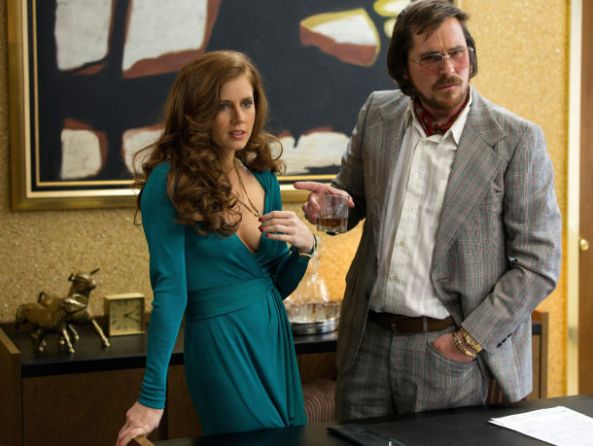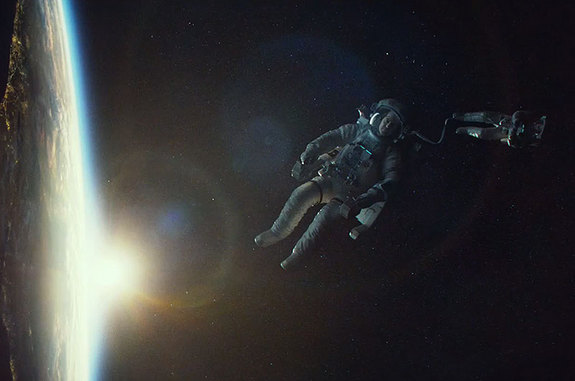Last year I got absolutely embroiled in the Oscar race. Such is the case when you have inordinate amounts of time on your hands. I wrote weekly round up columns of all the news and shake-ups in the race, and it was a blast.
This year, contenders have come and gone, with some setting the world on fire (“Gravity”, “12 Years a Slave”), some fizzling out fast (“The Fifth Estate”, “The Counselor”) and others getting pushed to 2014 and out of the race all together (“The Monuments Men”, “Foxcatcher”).
But whereas last year was remarkably unpredictable, this year’s race started early and shows little sign of relenting. The media quickly took over and has aimed to influence the outcome in anyway they can.
Why am I even bothering then to enter my voice into the fray? I chimed in with a controversial piece on why “Gravity” won’t win Best Picture just the other day, and I may yet change my mind, but I was originally going to resume my column and do so as a video.
Now to do so seems futile, and if I’m going to make picks at all, I’d like for them to add something to the conversation. I’d like for them to be pieces that involve me actually having seen the movies in question and not just responding to the media buzz. Hopefully I can call bullshit when need be too.
The smarter pundits out there do no different, and they’ve already been more than critical of the hyperbole that in late October has already made this race exhausting.
I’ll at least make clear now these articles will be less frequent. I can’t promise that they’ll be vastly different than what you might read anywhere else, but they’ll serve as sanity checks in an awards circuit run wild.
* Designates a movie I’ve seen
Bulleted entries are Dark Horse candidates ranked in likelihood of getting in
Best Supporting Actor
- Tom Hanks – Saving Mr. Banks
- Michael Fassbender – 12 Years a Slave*
- Jared Leto – Dallas Buyers Club
- Josh Brolin – Labor Day
- Bradley Cooper – American Hustle
- Daniel Bruhl – Rush*
- Barkhad Abdi – Captain Phillips*
- Jake Gyllenhaal – Prisoners*
- John Goodman – Inside Llewyn Davis*
- Jonah Hill – The Wolf of Wall Street
- David Oyelowo – Lee Daniels’ The Butler*
- Andrew Dice Clay – Blue Jasmine*
- Matthew McConaughey – Mud*
- Geoffrey Rush – The Book Thief
- James Franco – Spring Breakers*
- James Gandolfini – Enough Said
So the first thing you’re wondering is, why is James Franco so low? After having just revisited “Spring Breakers,” Franco’s reptilian, corn-rowed, drug addled performance is something special. It’s dark and twisted but as much vulnerable and affecting as it is iconic and outrageous. Distributor A24 is taking his campaign somewhat seriously, as they’ve put out two “Consider This Shit” ads. Sadly, honoring a performance like that is simply not how the Academy works.
But to look at the field more practically, Tom Hanks is being argued by some as capable of winning a third Oscar. He seems to also be a lock for Lead Actor, but this is the one where he puts on his classic charm and shows why he’s a real movie star, but a likable one too. Having seen Michael Fassbender’s work in “12 Years a Slave,” it’s monumental. Physical, animalistic, and yet also sickly compassionate and reserved. He won’t be ignored like he was for Steve McQueen’s last film “Shame.” Whether or not the Academy will recognize another villainous turn in this role is another question. Jared Leto has earned a lot of buzz for his cross dressing role in “Dallas Buyers Club,” so he seems likely and could steal a win if the movie is liked enough.
More pundits however are arguing for Daniel Bruhl in “Rush.” To me the performance strikes me as mostly one-dimensional, a calculated job for which Bruhl may very quickly be typecast. Barkhad Abdi seems most likely to be the most worthy snub from a not quite stacked bunch, but a good group of nominees when I think how much I’d love to see Matthew McConaughey, Andrew Dice Clay, John Goodman or Jake Gyllenhaal all break into the mix.

Best Supporting Actress
- Oprah Winfrey – Lee Daniels’ The Butler*
- Octavia Spencer – Fruitvale Station*
- Lupita Nyong’o – 12 Years a Slave*
- June Squibb – Nebraska*
- Jennifer Lawrence – American Hustle
- Julia Roberts – August: Osage County*
- Margo Martindale – August: Osage County*
- Sarah Paulson – 12 Years a Slave*
- Sally Hawkins – Blue Jasmine*
- Amy Adams – Her
- Kristen Wiig – The Secret Life of Walter Mitty
- Naomie Harris – Mandela: Long Walk to Freedom
- Scarlett Johansson – Her
The supporting actress category is especially strong this year, and it’s amazing to me to see three African American actresses as near locks for this category. Oprah has star power on her side for this nomination, but she’s more than serviceable in “The Butler.” It’s a nuanced performance that never goes overboard. Octavia Spencer may be the only nomination “Fruitvale Station” gets this year. June Squibb is outrageous in “Nebraska,” and she has more than a few show-stopping moments that could win her an Oscar. But my money is on Lupita Nyong’o, a remarkably brave performance among many in “12 Years a Slave,” but she holds her own against titans of cinema.
The reason however I’ve included Jennifer Lawrence in my fifth spot is because I am beyond confused about “August: Osage County’s” role in this race. It was originally rumored that Meryl Streep might be campaigned for Supporting Actress, as the movie is really Julia Roberts’ story. Now where Julia will be campaigned seems uncertain. It might mean bad news for Margo Martindale splitting the vote and coming up short.
Also an interesting footnote is Scarlett Johansson’s bid for “Her.” Keep in mind that Johansson does only voice work for the role, and although it’s a long shot, a nomination would be the first time voice acting alone managed to land an Oscar nod. Also, go Sally Hawkins! Easily the most underrated part of “Blue Jasmine.”

Best Actress
- Cate Blanchett – Blue Jasmine*
- Sandra Bullock – Gravity*
- Meryl Streep – August: Osage County*
- Emma Thompson – Saving Mr. Banks
- Judi Dench – Philomena*
- Kate Winslet – Labor Day
- Amy Adams – American Hustle
- Adele Exarchopoulos – Blue is the Warmest Color
- Julie Delpy – Before Midnight*
- Berenice Bejo – The Past
Perhaps more than any race, Best Actress is especially tight. Months ago this seemed to be Blanchett’s Oscar to lose. Now all five candidates stand to be former winners, with Kate Winslet or Judi Dench acting as the fifth spot contenders, and anyone could give them a run for their money. Blanchett, with the help of Woody Allen and his reputation for championing women to Oscar wins, delivers a convincingly dignified nervous breakdown. Sandra Bullock shows depth and naturalism under the worst of acting conditions. And Streep chews as much scenery as you may have imagined. Streep’s spitfire performance is a thousand times better than her work in “The Iron Lady,” one that has as much pathos and depth as it does firecrackers, so I’m finding it hard to say she couldn’t win a FOURTH Oscar.
If there’s a reason I don’t like Dench in the fifth spot, it’s because Philomena Lee is an awkward character that Dench doing what she does best doesn’t fully earn. Just how big is Amy Adams’s role in “American Hustle” is a looming question mark, but on the outskirts are Exarchopoulos, coming off a big controversy with her director and film, and Delpy, who needs to strike while the iron is hot if she is to convince the Academy that her Celine is a character 18 years in the making.

Best Actor
- Chiwetel Ejiofor – 12 Years a Slave*
- Tom Hanks – Captain Phillips*
- Robert Redford – All is Lost
- Bruce Dern – Nebraska*
- Matthew McConaughey – Dallas Buyer’s Club
- Oscar Isaac – Inside Llewyn Davis*
- Leonardo DiCaprio – The Wolf of Wall Street
- Christian Bale – American Hustle
- Forest Whitaker – Lee Daniels’ The Butler*
- Joaquin Phoenix – Her
- Idris Elba – Mandela: Long Walk to Freedom
- Michael B. Jordan – Fruitvale Station*
Best Actor always seems to be a packed race, so it smacks of hyperbole to say that this year is more or less so than in years past. But what is unique about this year is that given this deep field in which more than a few worthy candidates will be left out, there does not seem to be a notable frontrunner.
Ejiofor will earn his spot because his movie more than anything validates it. It’s a magnificently brave performance with any number of stunning displays of talent to point to as evidence. Hanks, Redford, Dern and McConaughey however have more of the buzz. While McConaughey’s time is due, Hanks, Dern and Redford have all used their performances as something of comebacks, proof to the Academy and the world that they are deserving of the titles of some of America’s great actors.
And yet who is the most vulnerable in such a category when there are so many other possibilities? Hanks could be out if he’s the front-runner for Supporting. Dern may be too modest and simple in Alexander Payne’s lightweight (but brilliant) film. And it may NOT be McConaughey’s time. Maybe it’s Leo’s time, or Joaquin Phoenix’s time, who shows a sentimental side in “Her” the Academy didn’t know he had. Oscar Isaac is as deserving as all these actors, but his deeply lived in, realistic performance is made to feel unlikeable, not in the juicy, good way, and it may hurt him.

Best Director
- Steve McQueen – 12 Years a Slave*
- Alfonso Cuaron – Gravity*
- Paul Greengrass – Captain Phillips*
- David O. Russell – American Hustle
- Joel and Ethan Coen – Inside Llewyn Davis*
- Martin Scorsese – The Wolf of Wall Street
- Spike Jonze – Her
- Alexander Payne – Nebraska*
- J.C. Chandor – All is Lost
- John Lee Hancock – Saving Mr. Banks
- Denis Villeneuve – Prisoners*
Best Director, as evidenced by every year except last one, is a good barometer for the Best Picture front runners and vice versa. So it seems as though McQueen and Cuaron are sure-fire locks. Not only are their films magnificent, there’s no question that their vision is integral to their success.
Greengrass helms the next big frontrunner, and this movie is directly up his alley. “Saving Mr. Banks” is the fourth biggest contender, but John Lee Hancock will not be the face or name people remember after seeing that film.
So that leaves O. Russell to clean up a “third time’s a charm” nomination, and the fifth will be a surprise. Scorsese has been snubbed here before, but Chandor and Villeneuve could be compelling dark horses if their movies don’t make the final Best Picture cut.

Best Picture
- Gravity*
- 12 Years a Slave*
- Captain Phillips*
- Saving Mr. Banks
- American Hustle
- August: Osage County*
- Lee Daniels’ The Butler*
- The Wolf of Wall Street
- Inside Llewyn Davis*
- 10. Rush*
- Nebraska*
- All is Lost
- Blue Jasmine*
- Before Midnight*
- Her
- Dallas Buyers Club
Whew. That’s quite a field. I can speak with certainty to the top three at the very least. In fact, this is a two, if not one horse race as far as many are concerned.
“Saving Mr. Banks” is currently very strong after its very first premiere, so it seems next likely. “American Hustle” and “The Wolf of Wall Street” will have a lot of hype to live up to, and if they fail, then this could be a very different field. Otherwise, they seem to be confident contenders. “August: Osage County” will soon look very strong, and “The Butler” is looking increasingly weak, but each have big casts and Academy friendly ambitions, and it’d be tough to bet against them too.
What’s left are two spots, one I’ve reserved for the “indie” spot and the other for the “populist, sports movie” spot. Unfortunately there’s only one film that meets the latter criteria, and that’s the mediocre “Rush.” In the other category, just about a half dozen things could fill that single void, and currently “All is Lost” looks the strongest. My money will be on “Inside Llewyn Davis” to nab that indie spot, but it will depend on which movies critics and guilds come back for at the end of the year and how some of these movies perform with the public.





